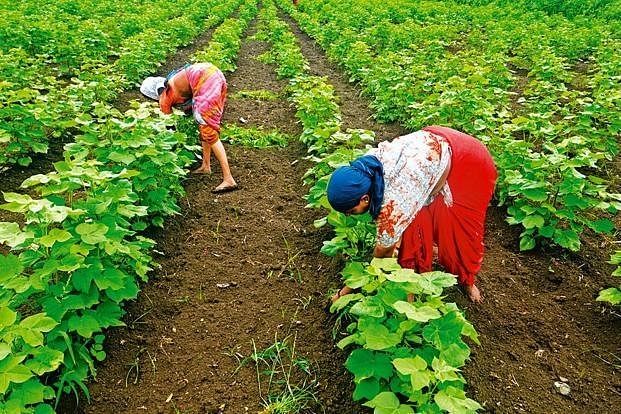Economy
PM Modi Interview 3: A Four-Pronged Strategy To Double Farmers’ Income By 2022
- The Prime Minister called on the private sector to increase investment in agriculture.

Modi vowed to double farmers’ income by 2022. (Abhijit Bhatlekar/Mint via Getty Images)
In this third part of the interview with Swarajya, Narendra Modi talked about how he will meet the promise to double farmers’ incomes by 2022. Read the previous part here)
Swarajya: Let us discuss farmers, where there is a lot of anger… Every government routinely claims that it is committed to the farmers. What is it that you are doing which is different from the previous government?
Modi: We have a stated aim of doubling farmers’ income by 2022 to make our farmers prosperous and agriculture profitable.
To make our farmers prosperous, we need to augment their sources of income and decrease the risks they face.
We are following a four-pronged strategy to achieve the goal of doubling farmers’ income: decrease the input costs, ensure proper prices for the produce, ensure minimal harvest and post-harvest losses, and create more avenues for income generation. If you focus closely on our policy interventions, they are aimed at helping farmers at every step – Beej Se Bazaar Tak.
The previous government allocated Rs 1.21 lakh crore to agriculture while we have allocated Rs 2.12 lakh crore in the five-year period. But unlike them, our initiatives do not stay limited to the files, but enter the field.
Swarajya: Can you given examples..
Modi: If you want an idea of what changed under our government, just remember the condition of farmers during those years. They were forced to do farming which was unscientific, they had to often bear the brunt of lathis for obtaining urea, they did not have a proper crop insurance cover, nor did they get proper prices for their produce.
To make farming scientific, farmers are now equipped with soil health cards. Shortage and scarcity of urea is a thing of past and neem-coated urea is improving productivity. Now the farmer has a holistic crop insurance cover with PM Fasal Bima Yojana.
Swarajya: What about minimum support prices?
Modi: Not only will the farmers get minimum support price of 1.5 times their cost, they also have more avenues to get the right price with the help of e-NAM (the electronic National Agricultural Market, which provides price, production and market information to farmers).
I would also like to urge the private sector to increase investment in agriculture. In India, private sector investment is only 1.75 per cent of total investment in agriculture. From technology to food processing and from modern machinery to research, there is huge scope for the private sector. If the market savviness and global best practices orientation of the private sector meet the hard work and determination of our farmers, it is a win-win for both the farmers and the private sector.
(To read the next part of the interview, click here. Modi on India Inc, Air India Sale and PSU Banks: Not Coy On Privatisation)
Support Swarajya's 50 Ground Reports Project & Sponsor A Story
Every general election Swarajya does a 50 ground reports project.
Aimed only at serious readers and those who appreciate the nuances of political undercurrents, the project provides a sense of India's electoral landscape. As you know, these reports are produced after considerable investment of travel, time and effort on the ground.
This time too we've kicked off the project in style and have covered over 30 constituencies already. If you're someone who appreciates such work and have enjoyed our coverage please consider sponsoring a ground report for just Rs 2999 to Rs 19,999 - it goes a long way in helping us produce more quality reportage.
You can also back this project by becoming a subscriber for as little as Rs 999 - so do click on this links and choose a plan that suits you and back us.
Click below to contribute.
Latest